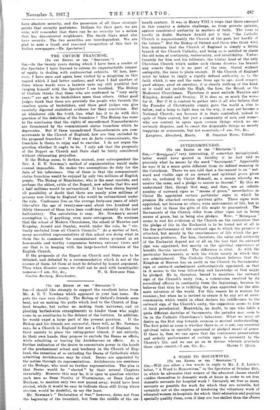THE CHURCH FRANCHISE.
[To rue EDROM or Tee 8reeTATOIt."1 Sin,—In the twenty years during which I have been a reader of the Spectator I have learned to esteem its imperturbable temper of equity in dealing with controverted subjects. Of late, how- ever, I have once and again been visited by a misgiving in this regard which I had better confess; and when I find another of those whose words were a lantern unto any still youthful feet ranging himself with the Spectator I em troubled. The Bishop of Carlisle thinks that those who are confirmed in "very early years" are apt to be backsliders more than others. Other good judges think that these are precisely the people who furnish the smallest quota of backsliders, and these good judges can give carefully digested statistical evidence for their conviction. But on whichever side the truth lies, what has it to do with this question of the definition of the franchise P The Bishop has come to the conclusion that the rights of unconfirmed Nonconformists are threatened by the communicant status franchise which he deprecates. But if these unconfirmed Nonconformists are com- municants in the Church of England, how are they excluded by the proposed franchise P If they are de facto communicants, the franchise is theirs to enjoy and to exercise. I do not argue the question whether it ought to be. I only ask that the proposals of the Report on Church and State shall be fairly considered without obfuscating prejudice.
If the Bishop seems to darken counsel, your correspondent the Rev. A. E. T. Newman's method of argumentation would make counsel impossible. He makes two assumptions do duty for the data of his inferences. One of these is that the communicant status franchise would be enjoyed by only two millions of English people. The Bishop of Manchester, who is the most resolute, and perhaps the ablest, critic of the Report, now admits that five and half millions would be enfranchised. It has been shown beyond all possibility of doubt that there are nearly nine millions of persons now living In England who would be enfranchised under the rule. Confirmees live on the average forty-one years of adult life—after the age of twenty-one—and about two hundred and thirty thousand of them have been confirmed annually in the last half-century. The calculation is easy. Mr. Newman's second assumption is, if anything, even more outrageous. He assumes that the school of Modern Churchmen, the school of Maurice and Kingsley, Arnold and Stanley, would, under the rule, be " vir- tually excluded from all Church Councils." As a matter of fact, many accredited representatives of this school are doing what in them lies to commend the communicant status proposal as an honourable and worthy compromise between extreme views and one that is in keeping with the large-hearted tolerance of the English Church.
If the proposals of the Report on Church and State are to be defeated, and defeated by a recommendation which is not of the essence of them, let them at least be defeated by honest argument. Then when disaster comes we shall not be mad with immitigable














































 Previous page
Previous page